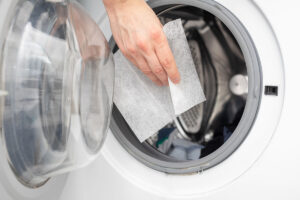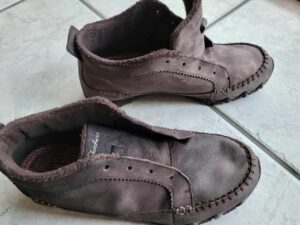What Water Temperature Should I Use for My Laundry?
-
 By
Sophia Grant
By
Sophia Grant

Not sure what washing machine temperature to use when washing your clothes?
Hot water is great for removing contaminants, however, it can be harmful to certain types of fabric. Cold water, on the other hand, is more gentle, however, it may not get your clothes as clean.
Simply follow the instructions on the care tag label – most will tell you what temperature you should use when you wash clothes.
Not only that but the laundry water temperature will also determine how well your detergent works. For example, some may not be as effective at certain temperatures.
Table of Contents
ToggleWhen to Use Hot Water For Your Laundry
Anything above 130 degrees Fahrenheit (54 Celsius) is considered “hot water.”
Just because it can damage fabrics, however, doesn’t mean you should avoid it altogether. In fact, some garments are better off washed with a hot setting.
As long as you follow the manufacturer’s instructions, you shouldn’t run into any problems.
When should you use the hot setting?
The hot setting is not only effective for cleaning but it disinfects and deodorizes as well.

As a general rule, you want to use the hot setting on items that are made from strong fibers such as cotton and linen. Even then, it may be a good idea to reserve it for heavily soiled clothes.
Will hot water shrink your clothes?
Yes, the heat can cause certain fabrics to shrink.
Take polymer fibers, for instance, they are stretched out when made into clothes. This means when they’re exposed to heat, the tension will be released and that will return them to their natural, shorter state.
Cotton and wool are also prone to shrinking as they tend to absorb quite a bit of water.
Will hot water cause colors to fade?
Contrary to popular belief, hot water is not related to color loss. Rather, it has more to do with the dryer, or more specifically, the tumbling and high heat of the dryer. Normal wear and tear can cause the dyes to fade over time as well.
What fabrics can you wash with the hot setting?

Cotton and linen can be washed with hot water as long as they’re preshrunk. Durable synthetics such as polyester can also be washed on a hot setting.
With that said, it’s best to err on the side of caution. Even for items that are compatible with hot water, it’s best to alternate between cold and hot washes.
Running a hot water cycle is the best way to sanitize towels and bed sheets.
When Should I Wash My Clothes on a Warm Setting?
Warm water packs a good amount of cleaning power. It isn’t aggressive on fabrics either, which makes it a good choice when you’re washing clothes.
Generally speaking, a water temperature of 90 to 110 degrees Fahrenheit (32 to 43 degrees Celsius) is considered warm.
Will the warm water setting shrink your clothes?
Warm water can cause certain garments to shrink. Unlike hot water, however, the process is more gradual, meaning the shrinking will likely happen over multiple washes.

Remember, each fabric has its own maximum shrinkage capacity. In other words, warm or hot water will have the same effect over time – it’s just a matter of when it will happen.
What items should you wash with warm water?
Warm water should be used for man-made fibers such as polyester, rayon, nylon, and spandex.
Other fabrics such as cotton and linen can also be washed with a warm wash cycle as long as they’re lightly soiled.
Keep in mind that warm water will not be as effective at sanitizing as hot water.
What Clothes Should Be Washed With Cold Water?
Cold water cycles are typically between 60 to 80 degrees Fahrenheit (15 to 27 degrees Celsius). Not only are they the gentlest on your clothes but they’ll save you money on your energy bill as well.
Keep in mind, however, that cold water is not the best choice if you want a thorough cleaning.
Is it true that you can use a cold wash cycle for all clothing?
Yes, you don’t have to worry about damaging your garments with cold water. Just remember that it won’t be as effective as hot or warm water when it comes to lifting stains.
What kind of fabrics should be washed with cold water temperatures?
Cold water can be used to wash almost any type of fabric. There are also certain garments that you should only wash with a cold cycle.

Take swimsuits and bras, for instance, these types of delicate items should always be washed with cold water as the hot water setting can damage the elastic. It’s also a good idea to wash bright-colored and dark clothes with cold water as they will last longer.
Should you wash soiled clothes with cold water?
Cold water is not capable of killing germs. If your goal is to sanitize, you’re better off using hot or warm water. It is, however, capable of removing oils and debris when paired up with detergent.
Picking the Right Water Temperature On Your Washing Machine
Some washing machines may automatically set the water temperature based on the cycle that you choose. In cases like this, you may want to override it manually.
Most machines, however, will let you set the temperature manually.
Laundry Detergents and the Right Washing Machine Temperature
Nowadays, most if not all laundry detergents can be used with any water temperature. With that said, results can vary.
For instance, some products will work better in cold water than others. Some detergents, however, will not be strong enough to clean your clothes properly in cold water. Given this, you might want to do some research as to which product will be best for your garments.
SAVE
15% off
Your Next ACTIVE
Purchase on Amazon
15% Off Your Order on Amazon
×Click below to reveal the 15% off coupon for your entire ACTIVE purchase on Amazon.com
Limited Time Offer




